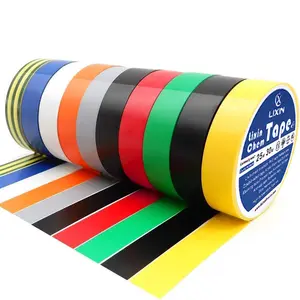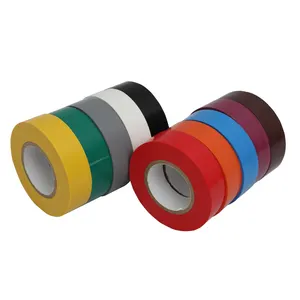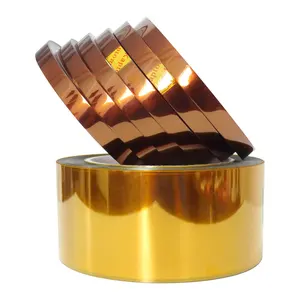Heat resistant electrical tape is an indispensable tool in the arsenal of professionals dealing with electrical systems. This specialized tape is engineered to withstand extreme temperatures, ensuring the safety and integrity of electrical connections.
Types and Characteristics of Heat Resistant Electrical Tapes
Diverse types of heat resistant electrical tape cater to different industrial needs. For instance, high temp electrical tape is often used in environments like engine compartments where temperatures can soar. On the other hand, electrical tape high heat variants are suited for electronic components that may not encounter direct flames but still require protection from high ambient temperatures. Each type is formulated with specific characteristics such as thickness, elasticity, and adhesive strength to address particular scenarios, ranging from simple wire bundling to providing a heat shield for wiring in aerospace applications.
Structure and Operation of Heat Resistant Electrical Tapes
The structure of heat resistant electrical tape is a marvel of engineering. A typical high temperature insulation tape consists of a backing material, usually fiberglass or polyimide, coated with a high-performance adhesive such as silicone. The tape is designed to be wrapped around electrical wires and connections, forming a protective layer that can withstand high temperatures. The adhesive side is pressure-sensitive, allowing for a strong, lasting bond, while the non-adhesive side provides insulation and heat resistance.
Materials and Their Properties
The materials used in heat resistant electrical tape are chosen for their exceptional properties. Fiberglass, for example, provides excellent tensile strength and thermal resistance, making it ideal for glass cloth tape high temperature applications. Polyimide is selected for its ability to maintain its insulating properties at extreme temperatures, which is crucial for high temperature electrical insulation tape. These materials are not only chosen for their ability to resist heat but also for their durability and flexibility, which are essential for the protection of electrical components.
Business Usages and Applications
In the business realm, heat resistant electrical tape is a critical component in sectors such as automotive manufacturing, where high temp wire harness tape is used to bundle wires that are exposed to the high temperatures of the engine bay. In the electronics industry, electrical tape for high heat applications ensures that sensitive components are shielded from thermal damage, thus maintaining system integrity and preventing costly failures. These tapes create business value by enhancing the reliability and safety of electrical systems, which is paramount in any industry.
Functions of Heat Resistant Electrical Tapes
The primary function of heat resistant electrical tape is to insulate and protect electrical connections and wires from high temperatures. However, these tapes also serve to secure wires, preventing them from abrasion and environmental damage. Specialized tapes, such as fireproof electrical tape, are designed to resist ignition and prevent the spread of flames, adding an extra layer of safety in fire-prone environments.
Features of Heat Resistant Electrical Tapes
One of the unique selling points of high temperature electrical tape is its ability to maintain adhesion in extreme conditions. Features such as UV resistance, flexibility, and the ability to withstand a range of temperatures from low to high are what set these tapes apart from standard electrical tapes. The electrical tape high heat variants are also designed to be non-conductive, ensuring they do not interfere with the electrical properties of the components they are protecting.
Benefits of Using Heat Resistant Electrical Tapes
The use of heat resistant electrical tape brings numerous benefits. It provides a reliable solution for maintaining the integrity of electrical systems in harsh conditions. The tapes' heat-resistant properties ensure that they continue to perform even when exposed to high temperatures, reducing the risk of electrical failures and potential fire hazards. This reliability translates to fewer maintenance requirements and lower costs over time.
How to Use and Choose the Right Heat Resistant Electrical Tape
Using heat resistant electrical tape effectively involves cleaning the surface before application to ensure the tape adheres properly. When choosing the right tape, consider the maximum temperature exposure and the specific conditions of the environment. For example, high temp insulation tape with a silicone adhesive is ideal for high-temperature industrial environments, while a tape with an acrylic adhesive may suffice for lower-temperature applications.
How to Clean and Maintain Heat Resistant Electrical Tapes
Cleaning and maintaining heat resistant electrical tape is straightforward. The tape should be inspected regularly for signs of wear and replaced if necessary. To clean, simply wipe the surface with a dry cloth. If the tape is in an environment where it is exposed to contaminants, a mild solvent may be used to remove any residue.
How to Install Heat Resistant Electrical Tapes
Installation of heat resistant electrical tape is a simple process. Begin by measuring the length of tape needed, then cut and firmly wrap it around the wire or connection, overlapping each layer to ensure complete coverage. Press down to secure the adhesive.
Target Audience and Meeting Needs
The target audience for heat resistant electrical tape includes electricians, automotive technicians, aerospace engineers, and maintenance personnel in industrial settings. These professionals rely on the tape's ability to protect against high temperatures and electrical interference, ensuring the safety and functionality of the systems they work on.
What are the key factors to consider when selecting a heat resistant electrical tape for industrial use?
When selecting a heat resistant electrical tape for industrial use, it is important to consider the maximum temperature range, the environmental conditions (such as exposure to chemicals or abrasion), the type of adhesive, and whether the tape needs to be double-sided or single-sided. The tape's conformability to irregular surfaces and its dielectric strength are also crucial factors.
How does the adhesive type affect the performance of heat resistant electrical tapes?
The adhesive type affects the performance of high temp wire tape significantly. Pressure-sensitive adhesives offer convenience but may not perform well in extreme conditions. Hot melt adhesives provide stronger bonding at high temperatures, while water-activated adhesives can offer superior longevity and resistance to environmental factors.
Can heat resistant electrical tape be used for both indoor and outdoor applications?
Yes, high temperature electrical tape can be used for both indoor and outdoor applications. However, for outdoor use, it is essential to select a tape that is specifically designed to withstand UV light, moisture, and temperature fluctuations to ensure the tape maintains its integrity and performance.






































 浙公网安备 33010002000092号
浙公网安备 33010002000092号 浙B2-20120091-4
浙B2-20120091-4